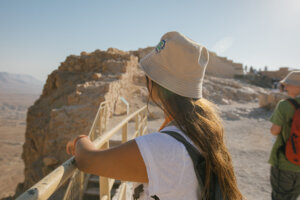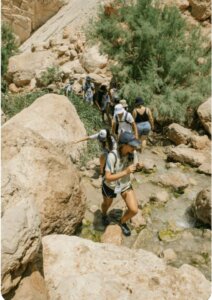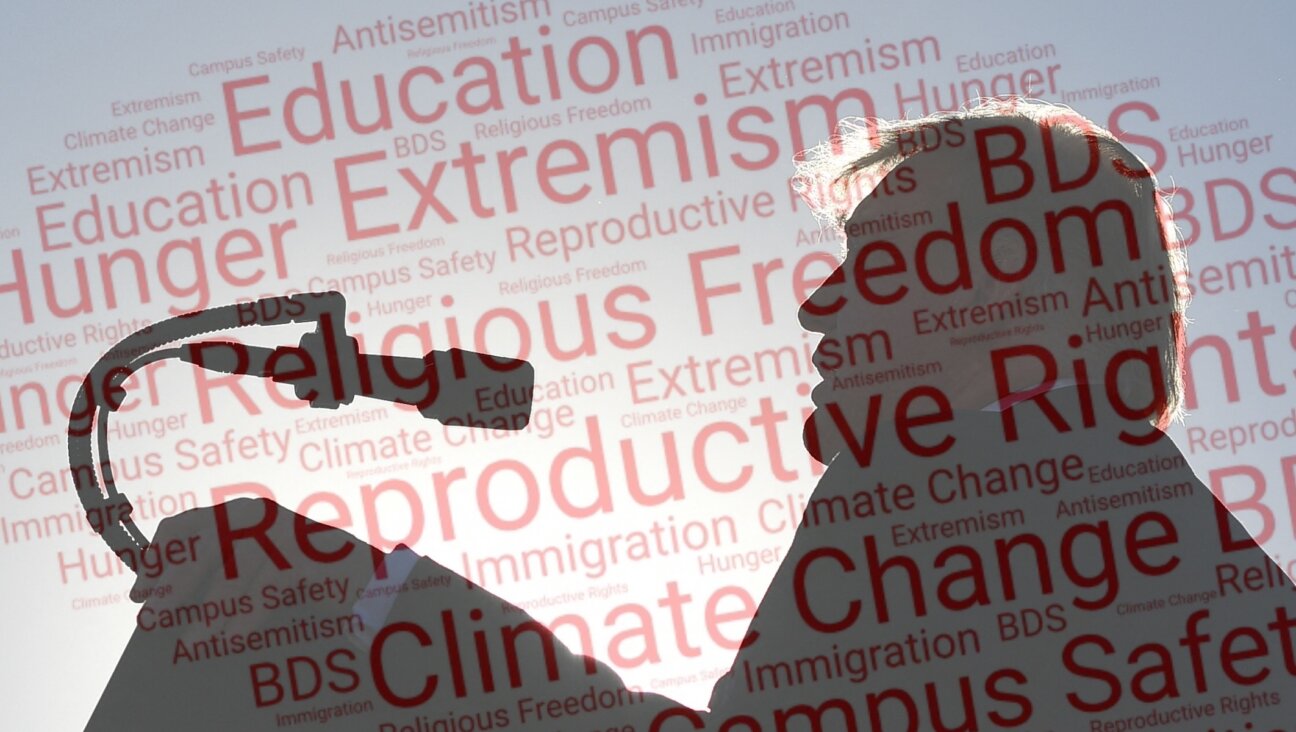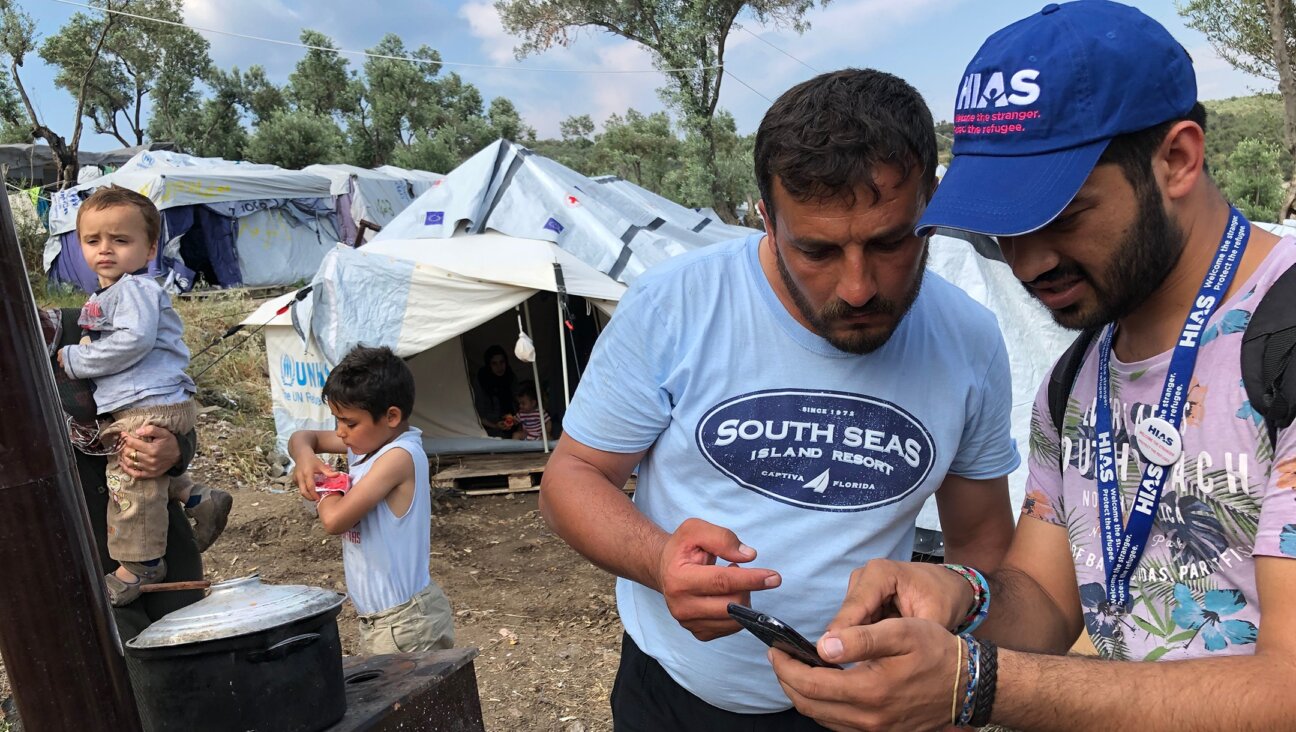Camps cancel summer trips to Israel because of war, low enrollment
For many American families, wartime is the wrong time for a teen trip, but others want to show support for Israel

Teenagers from North America on a summer trip to Israel. Courtesy of RootOne
Enrollment in summer camp trips to Israel for Jewish American teens is down dramatically this year compared to last year. Some camps have canceled trips altogether. Some are combining trips with other camps to get a critical mass. Many are offering trips to Central America, Europe or U.S. destinations instead.
While safety is a concern in the aftermath of Hamas’ Oct. 7 attacks, it’s not the only issue. Some parents think back to their own carefree adventures in Israel, and they worry that sending kids when the country is at war won’t inspire the positive connections these trips are designed to foster.
Betsy Silverfine reluctantly decided against sending her 15-year-old son to Israel with Camp Cedar Lake in Milford, Pennsylvania, then found out the trip was canceled anyway. “I really wanted him to go,” she said. But, she added, “I want him to have this absolutely wonderful experience, to go to Masada, to feel like, ‘Oh my God, these are my people,’ and not, ‘I’m worried for my people.’ Everyone wants their child to not only enjoy the summer, but to have a takeaway from it forever. And I don’t want the takeaway to be an unsettling, fearful feeling.”
Trips to Israel have long been a rite of passage for teenagers from Jewish summer camps. Campers hear about them from a young age and look forward to going with camp friends, a year or two before college, as a culmination of the camp experience. Typically logistics are arranged by institutions affiliated with the camp — whether Reform, Conservative or Orthodox movements or other organizations. Itineraries often include climbing Masada, floating in the Dead Sea and praying at the Western Wall. Some trips visit Bedouin villages and meet Palestinian citizens of Israel.
But things are different this year. Trips are more mission-focused, with volunteering and meeting Israelis affected by Oct. 7 a big part of many itineraries, along with promises that border areas and other vulnerable destinations will be avoided.
For some parents, the idea of sending an American teenager to a country at war is simply untenable. But parents who are all for the trips say there’s never been a more important time to support Israel. If being there in this fraught moment means kids learn about Israel’s challenges, they say, so be it.
By the numbers
A spot-check of various camps and organizations by the Forward found that:
- The Foundation for Jewish Camp reports that campers typically represent about 36% of all participants in teen travel programs to Israel. Enrollment in those programs was down by about a third compared to last summer.
- RootOne, which provides $3,000 vouchers for teens joining group trips to Israel, expects to subsidize trips for just 500 teens — compared to 5,000 in 2023. “We focus on teens not enrolled in Orthodox day schools, and among the organizations we work with, we expect to be sending 10% of the number of teens we sent last year,” said executive director Simon Amiel.
- The Reform movement’s Yallah! Israel program, which typically sends hundreds of teens to Israel on summer camp trips, had just 47 enrolled by March 12.
- Sign-ups for Israel trips fielded by NCSY (formerly known as the National Conference of Synagogue Youth) are down 20% overall. “Our day school kids’ numbers are strong,” said David Cutler, director of NCSY’s summer programs, but enrollment among students in public school is not: “We were supposed to bring 20 buses of public school kids this summer; we’re probably going to bring five to eight.”
- The Conservative movement has 24% the number of applicants for Israel trips this summer compared to last year. A separate program for rising 12th graders, Ramah Israel Seminar, run by Ramah, the camping arm of the Conservative movement, has nearly 200 teens signed up; last year 280 went.
Showing support for Israel

Deborah Turobiner spent time in Israel 30 years ago when she was a teenager, so she understands why parents want their kids to have the same magical, carefree experience that they did. “But it’s a different world now,” she said. “If we sit here and wait for things to be that way again, we may never get there. My feeling is, Israel needs us. They need the tourism and the sense of connection with America. If there’s one thing we can do now, it’s support them with our money.”
And so, Turobiner is sending her daughter, Levie, to Israel this summer, even though she’ll be one of just three kids going from Camp Hess Kramer, a Reform movement camp run by Wilshire Boulevard Temple in Los Angeles. “There are about 30 kids her age going into 11th grade in the fall,” she said. “They should all be going to Israel, but as of now it’s just her and two boys.”
Turobiner also said she has “no qualms” whatsoever about security. “The programs are taking safety so seriously, I literally have zero concerns,” she said. “You feel safer there than here.” In fact, she thinks parents who are sending teenagers to places like London and New York instead are taking a bigger risk, due to the uptick in antisemitism: “I feel like that’s more dangerous than Israel.”
New itineraries: More volunteering
For those who do sign up, organizers are promising an experience that is safe, fun and meaningful.
“We’re going to give Israel a giant hug and help them in every way we can help, whether it’s working with displaced families or picking fruits and vegetables,” said NCSY’s Cutler. “Our tagline is, ‘Best summer ever,’ and we actually think this will be our most meaningful summer ever. Israel needs us. They want us there.” New itineraries will involve “more volunteering, giving back, but everyone will have felt a real sense of purpose.”
RootOne’s Amiel said the trips will also help kids “explore the challenges, the nuances, of how 10/7 has changed Israel and the impact of that. I would assume the vast majority of parents wouldn’t want their kids to go to Israel and not see a little bit of that and not understand a little bit of what that means.”

The Kings Bay Y in Brooklyn, New York, will have kids meet with soldiers and representatives of hostage families, along with volunteering and sightseeing. And the Reform movement’s Yallah! itinerary, billed as a “once-in-a-lifetime opportunity to contribute to Israel in a deeper way,” lists “spending time with evacuees to hear their stories and extend our support, as well as opportunities to learn more about the current agricultural crisis by volunteering on a farm and a food pantry.” An alternative trip is also being offered to the Pacific Northwest.
Jeremy Fingerman, CEO for the Foundation for Jewish Camp, said that while bringing American teens to Israel does “provide strength” to Israelis, the support “goes in both directions, and it’s very powerful.” Visiting Israel recently with 45 camp directors, Fingerman found that the Israelis were “as concerned about us in North America, in the Diaspora, as we are about them. They’ve seen the rampant rise of antisemitism here, and they’re worried about us. They want to make sure we stay strong and we’re OK.”
‘It feels wrong to send teens into a war zone’
Several parents whose kids attend a Maryland camp affiliated with Habonim Dror, the progressive Labor Zionist youth movement, spoke on condition of anonymity to avoid stoking tensions, because, as one of them put it, the Israel trips have “really split” the camp.
One parent said his son “can’t see a way to visit Israel as a tourist and not feel that such a trip condones in some way what the IDF is doing now in Gaza.”
Another said it simply “feels wrong to send this kind of teenage group into a war zone.” People in Israel are “understandably traumatized,” and she worries that teens may not be able to process that and respond appropriately. “When a lot of people are dying, both Jews and Gazans, to send a teen trip in, for me, feels atonal,” she said.
The camp’s co-executive director, Abby Cohen, said she’d like her son to go if enough of his friends sign up, but wonders, “Is this the way to experience Israel? They may not be able to go to Jerusalem. They may not be able to go on the different hikes they want to do.” Ultimately, however, she decided, “This is Israel. This is what it’s going to be. It’s a good chance to connect with Israel, to see what’s going on and understand firsthand what’s happening.”
The kids’ laments
Carrie Kaufman’s son Ari, 17, has been going to a B’nai B’rith camp in Pennsylvania for seven years and had expected to go with camp friends to Israel this summer.
“But the camp made the decision to cancel Israel and they planned a trip to Costa Rica for 17 or 18 days instead,” said Kaufman, who lives in Saratoga Springs, New York. “For $6,500 it’s a lovely trip, but it’s not Israel.”
Ari said he and his friends had been looking forward to seeing Israel for years. “It would have been a very cool experience,” he said. “But now we don’t have that opportunity, the thing that’s been told to us since we were 7 years old. A lot of people are upset because of that.”
His mom spent her junior year in Israel during the Intifada. “It was amazing, even with all the turmoil,” said Kaufman. “Israel takes care of their Americans. It was very safe. And I think now more than ever, the kids should be showing their support for Israel. Staying away doesn’t help the situation.”
Ari also had no qualms about visiting in the aftermath of Oct. 7: “It would have been very interesting to see Israel responding.”
Levie Turobiner, the LA teen who is one of just three kids from her camp going to Israel, said that she, like Ari, was looking forward to the Israel experience from a young age. “Very few people are going from my camp, but I still really want to go,” she said. “And I’m really confident in their ability to keep us safe.”
Many of her peers are taking alternative trips offered by the camp, one to the U.S. South and one to the Pacific Northwest. But Levie already missed out on two trips to Israel when her bat mitzvah, which she’d planned to celebrate there, was canceled by COVID-19 shutdowns, first in June 2021, and again in December 2021.
“She’s going to Israel this summer,” her mother said, “as long as the trip runs.”
Editor’s note: This story has been updated to clarify Ramah and Foundation for Jewish Camp program numbers.






















